Nutrition and Diet
Developing healthy eating habits is the cornerstone to a good healthy life.
Principles
“We must eat to live and not live to eat”
“Let food be your medicine and not medicine be your food”
“Choose fresh and natural food”
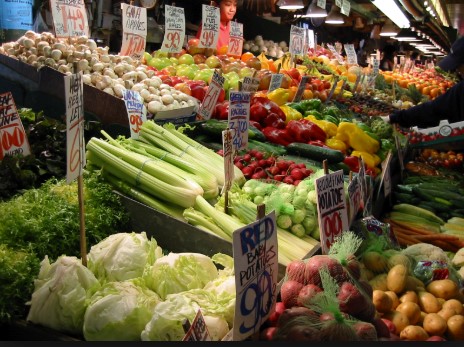
“If it looks like it’s made in the factory, AVOID it”
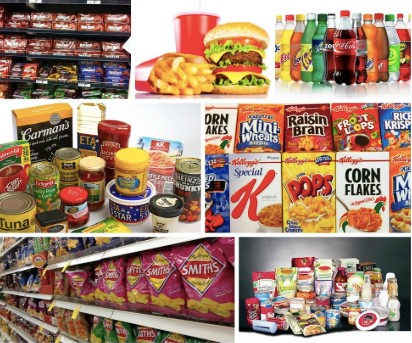
Reduce / Avoid the following:
Food type |
Examples |
Replace with |
Sugar / Fructose based syrup |
Soft drinks, processed fruit juices, candies, pastries, ice creams, table sugar |
Drinking water, black tea, green tea, black coffee, coconut water |
Grains |
Bread, pasta, wheat, spelt, rye, barley, rice |
Eat much less |
Vegetable oils |
Soybean oil, sunflower oil, corn oil, margarine |
Moderate amount of Coconut oil, flaxseed oil, MCT oil, olive oil |
Transfat |
Margarine |
Moderate amount of butter, ghee, lard |
Artificial sweeteners |
Aspartame, sucralose, saccharin |
A little bit of natural sweeteners eg stevia, erythritol, xylitol, |
Highly processed food |
Processed sausages, patties, meal replacements, microwave/ quick meals |
Natural food |
Choose / Eat the following:
Food type |
Examples |
Quantity / Amount per day |
Vegetables |
Broccoli, cauliflower, carrots, tomatoes, onions, garlic, peppers, |
> 50% of total vege choice |
Leafy Vegetables |
Spinach, kailan, kale, watercress, cabbage, lettuce, |
> 50% total vege choice |
Eggs |
Preferred free-range, pastured or omega-enriched eggs |
1/ day |
Fruits |
All variety of fruits eg, banana, apples, berries, avocado, oranges, local fruits papaya, guava |
Rotate/ eat different fruit everyday, |
Tubers |
Potatoes, sweet potatoes, yams, turnips |
Minimal, |
Nuts and Seeds |
Almonds, walnuts, hazelnuts, pumpkin seeds |
A handful |
Healthy fats and oils |
Extra virgin olive oil, coconut oil, avocado oil, MCT oil |
1-2 tablespoons / day in cooking or direct |
Meat |
Chicken – free range preferred, turkey, lamb, beef, pork |
Eat about a fistful size |
Fish |
Salmon, white fish eg Groupa, sea bass, deep sea fish |
|
Seafood |
Prawn, clams, shellfish |
Minimal , avoid for those with allergies |
Grains |
Choose whole grains eg brown rice, oatmeal, millet, quinoa, wild rice, whole berry |
Eat minimal whole grain as there are not much nutritional value Eg ½ cup serving size |
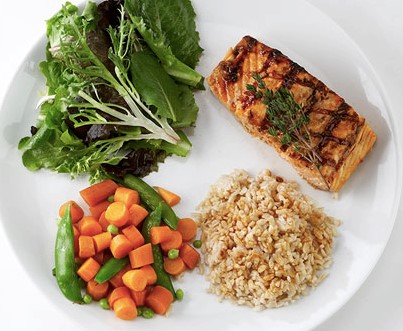
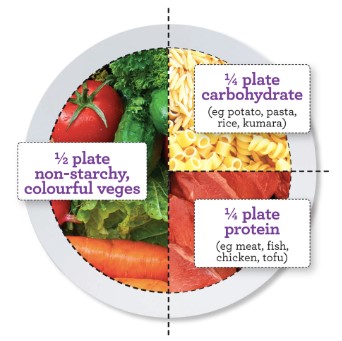
Carbohydrates (Carbs)
- Carbohydrates are one of the main macronutrients needed by our body for energy
- There are 2 types of carbohydrates ie Simple and Complex
- Simple carbs are simple sugars and processed sugars eg white bread, white sugar, pasta, candies and soft drinks
- Complex carbs are usually whole grains, vegetable, tubers, beans and pulses
- Recommended carbohydrate intake per day is 45-65% of total calories. 1gm for carbohydrate produce 4 kCal of energy
- It is recommended to consume complex carbs so that glucose is slowly broken down and absorbed into the body’s blood stream to prevent high blood sugar level spikes.
- Fibers are also an important part of carbs that are found in vegetables
Choose Complex Carbs over Simple Carbs
Simple Carbs to Avoid |
Complex Carbs Choices |
Candies / Sweets |
Dried fruit / Whole fruits |
Soft Drinks / Soda |
Fresh fruit juice or water with slice of fruit |
White bread |
Wholewheat / Brown bread / Sprouted grain bread |
Pasta |
Whole wheat pasta/ Black bean pasta/ Chickpea pasta |
Cereal |
Bran cereal/ Oatmeal |
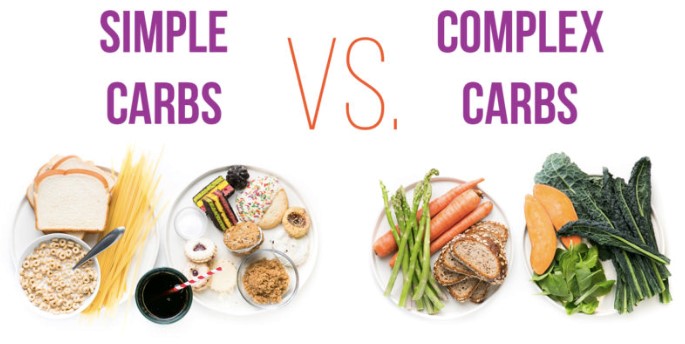
Source:
![]() https://www.livescience.com/51976-carbohydrates.html
https://www.livescience.com/51976-carbohydrates.html
Protein
- Protein is another essential macronutrient that consists of essential amino acids.
- Our body does not produce majority of the protein amino acids and thus they need to come from other food source
- Our body needs protein for growth and repair of virtually every part of our body tissues eg. like cells in muscle, bone, skin and hair. Protein is also converted into enzymes for metabolic reaction within the body
- Recommended protein intake is 10-35% of daily calories. Protein requirement per day is 0.8 to 1 gm of protein per kg body weight
- Good food sources of protein comes from meat, poultry, beans, peas, eggs, nuts and seeds
Good Protein Source
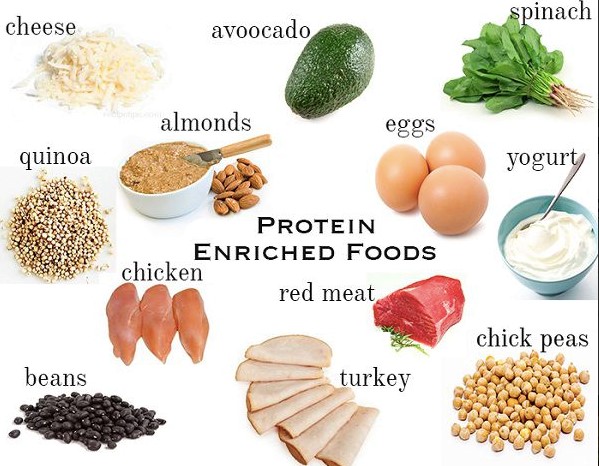
Source:
![]() https://www.livescience.com/53044-protein.html
https://www.livescience.com/53044-protein.html
Fat
- Fat is the 3rd main macronutrients that is needed by our bodies
- Fat is very important for normal body function and metabolic enzyme reaction. Cholesterol isn’t all bad and it is needed by the body for hormone and enzyme metabolism
- Recommended fat requirement is 10% of the total daily calories (1 gm fat = 9kCal energy)
- Choose good fat over bad fat
Good Fat Choices
- Monounsaturated fat – olive oil, sesame oil, avocado, nut (almond, cashews, macadamia, hazelnuts)
- Polyunsaturated fat – pumpkin seeds, sesame seed, flaxseed, walnut, fatty fish (salmon, tuna, mackerel, cod, seabass), fish oil, soy milk
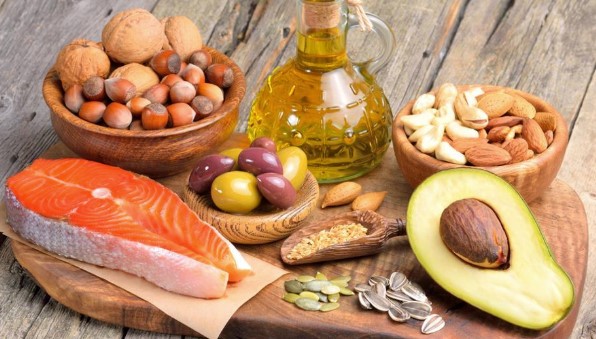
- Saturated Fat – although not as harmful as trans-fat, it is best consumed in moderation ie; 10% of your daily calories
- red meat (beef, lamb, pork)
- chicken skin
- whole fat dairy (milk, cream, cheese)
- butter, lard
- coconut oil
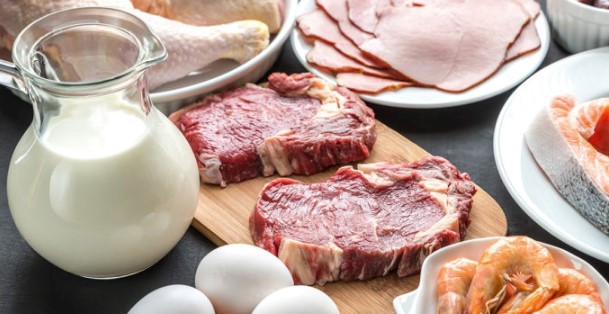
Bad Fat : Trans-fat
- commercially baked pastries, cookies, muffins, cakes, pizza
- packaged snack foods (crackers, chips, popcorn)
- margarine and shortening.
- fried foods ( fries, fried chicken, chicken nuggets, breaded fish)
- anything with vegetable oil
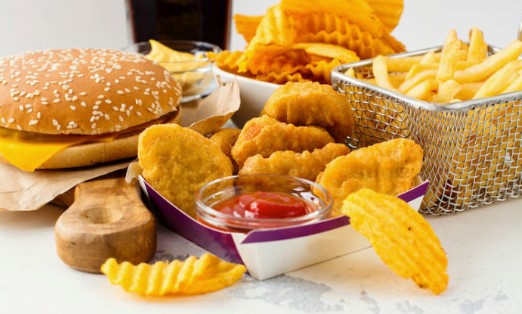
Source:
![]() https://www.livescience.com/53145-dietary-fat.html
https://www.livescience.com/53145-dietary-fat.html
